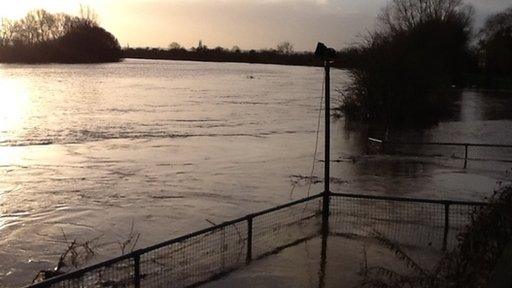UK flooding: Flood defences 'will be protected'
- Published

The River Severn burst its banks after a high tide combined with the Severn Bore
The Environment Agency will protect front-line flood defence services despite confirming hundreds of job cuts, the environment secretary says.
Owen Paterson said the agency needed to make efficiencies but he had received assurances about front-line services.
The agency had said cuts would have an impact on flood operations such as risk management, maintenance and modelling.
About 1,500 jobs will be lost at the agency although it is not clear how many flood-related posts will go.
The news came as many parts of the UK faced severe flood warnings.
'Spending more'
Mr Paterson said: "Like all departments, this department has had to make efficiencies given the dire financial position we inherited when we came to office.
"I had a meeting this morning with the chief executive of the Environment Agency. He has assured me he has every intention of protecting front-line services concerned with flooding. His intention is to protect front-line services as he makes his efficiencies.
"This government is spending more than any previous government on flood defences; 165,000 properties will be protected by 2015."
Mr Paterson's comments followed a meeting of the government's emergency committee Cobra.
It was told that 3,500km of coastal flood defences were tested by overnight storms and 130,000 homes were protected.
Chaired by Mr Paterson, the meeting included representatives from across government, including the Department for Communities and Local Government, the Home Office and the Department for Energy and Climate Change.
A spokesman for the Department for Environment, Food and Rural Affairs (Defra) said the government was spending more than £2.3bn on measures to tackle flooding and coastal erosion.
'Ring hollow'
Earlier the Environment Agency confirmed that jobs in flood protection would be cut as part of a major restructuring of the organisation, which covers England only.
The agency works with Natural Resources Wales to issue flood warnings for England and Wales.
Environment Agency spokesman Peter Fox told the BBC the cuts would have an impact on certain flood operations.
Asked about budget cuts, which were first announced in October, he said the agency had to save money and reduce staff numbers along with the rest of the public sector.
But he said it would seek to "protect front-line responses and flood incident management" and provide the "best services" possible with the reduced resources available.
The Environment Agency, which has an annual budget of £1.2bn, will reduce staff numbers from 11,250 to about 9,700 by October.
Agency chief executive Paul Leinster had told environment journal ENDS that it would have an effect on its capacity to support flood defence.
Friends of the Earth (FoE) said Mr Paterson's statement that front-line services would be protected was "bizarre".
FoE climate campaigner Guy Shrubsole said: "On the same day that the Environment Agency chief executive said that it's inevitable that Defra's cuts will impact on their ability to deal with flooding, Owen Paterson's bizarre claim that these front-line services will be protected will ring hollow for all those affected by the current flooding.
"Every £1 invested in protecting us from flooding saves £8 in damages. Cutting flood defence spending is a false economy and David Cameron now needs to intervene."
Budget squeeze
In November 2012, the government announced an extra £120m in funding for flood risk management schemes in response to frequent incidents in previous years.
Ministers insist that long-term capital spending to fund new defences is rising, with total funding on flood defence set to go up from £533m in 2013-14 to £569m in 2014-15.
But critics say funding for maintaining existing defences is set to fall as Defra - which oversees the agency - suffers one of the tightest budget squeezes across Whitehall.
A Defra spokesman said: "Departments and agencies across government are having to make choices about their budgets and the Environment Agency is making their own choices about how best to use their resources."
The Environment Agency issued nearly 7,000 flood alerts and warnings in 2012-13, the largest number in its history.
High tides and strong winds have brought flooding to Wales, Scotland and western England as officials warn of a continuing threat in parts of the UK.
Parts of southern England are only just recovering from widespread flooding before Christmas, while coastal areas across the UK suffered heavy flooding following fierce storms in early December.
- Published3 January 2014
- Published4 January 2014